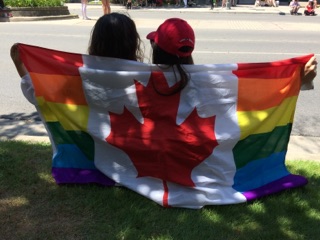When Mayor Matt Brown apologized to the LGBTQ2 community for actions taken by council more than 20 years ago, members of that community didn’t feel the apology came from the City of London as a whole.

They called for council to affirm the mayor’s apology, and at Tuesday’s meeting council voted unanimously to do just that, saying the City of London is sorry for what it had done.
“I wholeheartedly support the recommendation to reaffirm the apology by the mayor, that we do so unanimously as a council, and that we do so unanimously as a city,” said Ward 11 Coun. Stephen Turner.
“Never again will we turn our backs on our community.”
Council is seen as one body that makes one decision, said Turner, adding ultimately the city chose to not respect a large portion of the community and the impact on that community was significant.
Ward 2 Coun. Bill Armstrong is the only current council member who was sitting on council in 1995 when council and then-mayor Dianne Haskett denied a request from the Homophile Association of London Ontario to issue a Gay Pride proclamation.
He was one of 13 politicians who voted not to issue the proclamation.
“Council certainly struggled with what to do with the actions of the mayor of the day. We did the best we could,” said Armstrong.
He said the council of the day received advice behind closed doors that influenced his decision. He moved those documents be made public.
While the idea of transparency was supported by council, they were wary of any legal implications that may come with releasing confidential documents.
Deputy Mayor Paul Hubert moved to amend the motion in order to have the city solicitor review and report back with considerations related to releasing the information into the public domain.
The amended motion passed by a vote of 12-0.
Hubert got emotional during the debate. He said London needs to be a city where people’s strengths are celebrated, and their weaknesses are protected.
“That’s the kind of organization I like to be a part of. That’s the type of people I want to be around. The essence of that, is creating an environment of grace,” said Hubert.
It wasn’t until 1997 that the Ontario Human Rights Commission ruled Haskett and council had discriminated against members of the LGBTQ2 community.








Comments